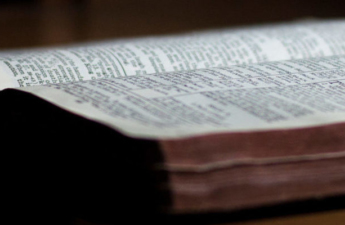Richard Baxter, A Christian Directory, Book 1, ch. 3
- A life of godliness is our living unto God as God, as being absolutely addicted to him.
- A life of faith is a living upon the unseen, everlasting happiness as purchased for us by Christ, with all the necessaries thereto, and freely given us by God.
- The contrary life of sense and unbelief, is a living, in the prevalency of sense or flesh, to this present world, for want of such believing apprehensions of a better, as should elevate the soul thereto, and conquer the fleshly inclination to things present.
- Though man in innocency, needing no Redeemer, might live to God without faith in a Redeemer; yet lapsed man is not only unable to redeem himself, but also unable to live to God without the grace of the Redeemer. It was not only necessary that he satisfy God’s justice for us, that he may pardon and save us without any wrong to his holiness, wisdom, or government; but also that he be our teacher by his doctrine and his life, and that he reveal from heaven the Father’s will, and that objectively in him we may see the wonderful condescending love and goodness of a reconciled God and Father, and that effectually he illuminate, sanctify, and quicken us by the operations of his word and Spirit, and that he protect and govern, justify and glorify us; and be the Head of restored man, as Adam was the root of lapsed man, and as the lapsed spirits had their head: and therefore we must wholly live upon him as the Mediator between God and man, and the only Saviour by merit and by efficacy.
- Faith is a knowledge by certain credible testimony or revelation from God by means supernatural or extraordinary.
- The knowledge of things naturally revealed (as the cause by the effect, &c.) is in order before the knowledge or belief of things revealed supernaturally.
- It is matter of natural revelation that there is a God; that he is infinite in his immensity and eternity, in his power, wisdom, and goodness; that he is the First Cause and ultimate End of all things; that he is the Preserver and overruling Disposer of all things, and the supreme Governor of the rational world, and the great Benefactor of all mankind, and the special favourer and rewarder of such as truly love him, seek him, and obey him: also that the soul of man is immortal; and that there is a life of reward or punishment to come, and that this life is but preparatory unto that: that man is bound to love God his Maker, and serve him, with all his heart and might; and to believe that this labour is not vain: that we must do our best to know God’s will, that we may do it. This, with much more, (of which some part was mentioned, chap. 1,) is of natural revelation, which infidels may know.
- There is so admirable a concord and correspondency of natural divinity with supernatural, the natural leading towards the supernatural, and the supernatural falling in so meet where the natural endeth, or falls short, or is defective, that it greatly advantageth us in the belief of supernatural divinity. Nay, as the law of nature was exactly fitted to man in his natural innocent state; so the law and way of grace in Christ is so admirably and exactly fitted to the state of lapsed man for his recovery and salvation, that the experience which man hath of his sin and misery, may greatly prepare him to perceive and believe this most suitable gospel or doctrine of recovery. And though it may not be called natural, as if it were fitted to innocent nature, or as if it were revealed by natural ordinary means, yet it may be so called, as it is exactly suited to the restoration of lapsed miserable nature; even as Lazarus his restored soul, though supernaturally restored, was the most natural associate of his body; or as bread, or milk, or wine, though it should fall from heaven, is in itself the most natural food for man.
- The same things in divinity which are revealed naturally to all, are again revealed supernaturally in the gospel; and therefore may and must be the matter both of natural knowledge and of faith.
- When the malicious tempter casteth in doubts of a Deity, or other points of natural certainty, it so much discrediteth his suggestions, as may help us much to reject them when withal he tempteth us to doubt of the truth of the gospel.
- There are many needful appurtenances [accessories] to the objects of a divine faith, which are the matter of a human faith. (Of which more anon.)
- Christ, as Mediator, is the way, or principal means to God, as coming to restore man to his Maker. And so faith in Christ is but the means to bring us to the love of God, though in time they are connexed.
- Knowledge and faith are the eye of the new creature, and love is the heart; there is no more spiritual wisdom, than there is faith; and there is no more life, or acceptable qualification, or amiableness, than there is love to God.
- All truths in divinity are revealed in order to a holy life; both faith and love are the principles and springs of practice.
- Practice affordeth such experience to a believing soul, as may confirm him greatly in the belief of those supernatural revelations, which he before received without that help.
- The everlasting fruition of God in glory being the end of all religion, must be next the heart, and most in our eye, and must objectively animate our whole religion, and actuate us in every duty.
- The pleasing of God being also our end, and both of these (enjoying him and pleasing him) being in some small foretastes attainable in this life, the endeavour of our souls and lives must be by faith to exercise love and obedience; for thus God is pleased and enjoyed.
- All things in religion are fitted to the good of man, and nothing to his hurt: God doth not command us to honour him by any thing which would make us miserable; but by closing with and magnifying his love and grace.
- But yet it is his own revelation by which we must judge what is finally for our good or hurt; and we may not imagine that our shallow or deceivable wit is sufficient to discern without his word, what is best or worst for us; nor can we rationally argue from any present temporal adversity or unpleasing bitterness in the means, that “This is worst for us, and therefore it is not from the goodness of God:” but we must argue in such cases, “This is from the goodness and love of God, and therefore it is best.”
- The grand impediment to all religion and our salvation, which hindereth both our believing, loving, and obeying, is the inordinate sensual inclination to carnal self and present transitory things, cunningly proposed by the tempter to insnare us, and divert and steal away our hearts from God and the life to come.
The understanding of these propositions will much help you in discerning the nature and reason of religion.




